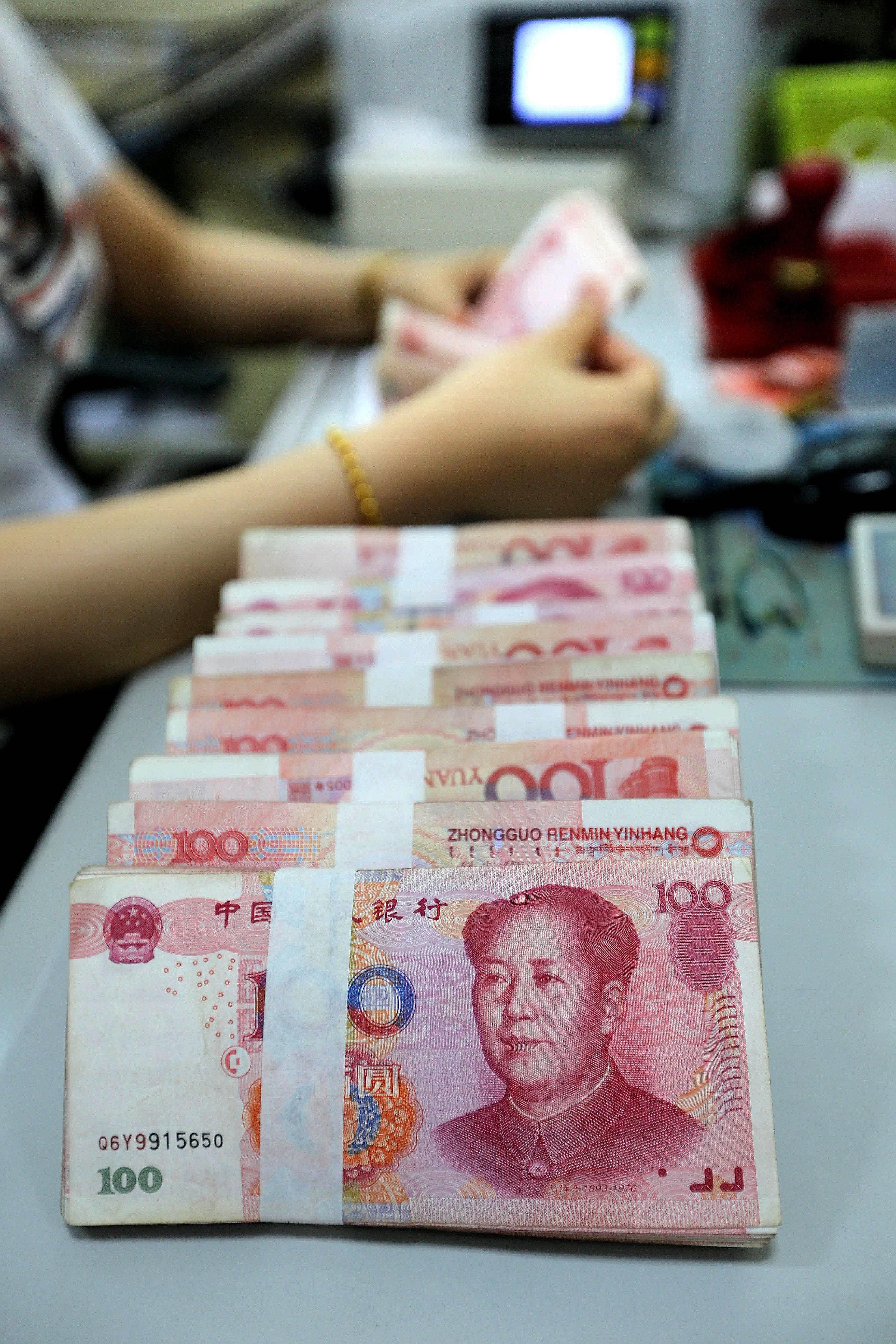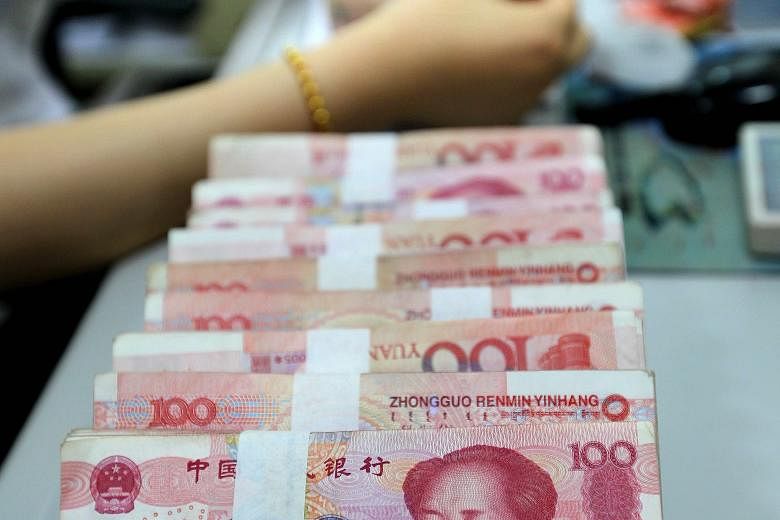BEIJING • Few would have heard of Special Drawing Rights (SDR) - an obscure "basket" of reserve currencies maintained by the International Monetary Fund (IMF) - if not for China's push for the yuan to go global.
Keen to have the Chinese currency included alongside the US dollar, euro, Japanese yen and British pound in this elite basket, Beijing stepped up the pace of financial reforms in the past two years so as to satisfy IMF rules on inclusion in the run-up to the fund's five-yearly review of the SDR next month.
If China succeeds, it might present more opportunities for financial centres like Hong Kong and Singapore - already the two largest offshore yuan hubs - to benefit from the growing fee-making business of yuan settlement and clearance.
Last Thursday, China started a payment system for cross-border yuan transactions to bolster the currency's global use. It also eased currency controls by opening up part of its domestic bond market to other central banks in recent months, and freed up the way interest rates on deposit products are determined.
The SDR was created in 1969 as a means for the IMF to provide liquidity to a country in financial trouble.
During the global financial crisis in 2009, for instance, the IMF backed an SDR allocation equivalent to US$250 billion (S$349 billion) to provide liquidity to the global economy. Member states can hold the allocated SDRs as part of their international reserves or sell part or all of their allocations.

These days, SDRs play a mostly arcane role in the global financial system as states largely rely on capital markets and credible hard currencies like the US dollar to cover their obligations. SDRs account for less than 3 per cent of total central bank reserve assets globally.
Still, experts tell The Straits Times that China is eager to see the yuan, also known as the renminbi (RMB), included in the SDR basket as it would be a milestone and a symbolic boost to the currency's global standing, giving other states more confidence to add it to their reserves.
"Turning the yuan into a global currency will raise China's diplomatic influence in the world," says Hong Kong-based DBS Bank economist Nathan Chow. "It will further lift the popularity of the yuan among not only central banks but also corporates and other institutions."
UBS economist Wang Tao, in a note, adds that the yuan's inclusion would also be an "official endorsement of its progress and standing in the international financial system".
Opinions are divided over whether the yuan makes the cut. While China easily meets the IMF's criterion of being a major exporter, the other criterion of having a "freely usable" currency is more ambiguous.
This is because the yuan is convertible for transactions such as trade and tourism, but the capital account, which has to do with inflows and outflows of capital, remains largely controlled.
Experts say the pressing question for the IMF is not so much capital controls, but whether a member state in crisis would be able to use the yuan if needed.
Mr Alaistair Chan, an economist with Moody's Analytics, is sceptical.
"What happens if or when there's a crisis and other governments want to use SDRs to buy imports, but China's government has put in capital controls to protect against outflows?" he asks. "Unfortunately, it seems that Beijing would instinctively try and control matters rather than let markets work."
His concerns are not unfounded.
Beijing's unprecedented intervention in the Chinese stock market since a collapse in mid-June has not only dented the credibility of a pledge by President Xi Jinping in late 2013 to let markets play a decisive role in the economy, but also tarnished efforts to establish the yuan as an official reserve currency.
Many felt that Beijing's failure to adequately explain the intent of reforms such as changes to its foreign exchange system that sparked global market turmoil in August was another setback for its SDR cause.
Moreover, signs of further weakening in the Chinese economy have raised fears that Beijing might lose its appetite for further reforms.
Dr Desmond Lachman, a resident fellow at the Washington-based American Enterprise Institute, says: "My expectation is that China will need to tighten its capital controls as its economy falters and as money continues to leave the country at a rapid rate. This will make (the yuan) even less freely usable."
But some analysts argue that while China might not meet all the technical requirements now, it is on track to do so and its positive trajectory makes a strong case for the yuan to be part of the SDR. Its use globally has surged, they say, albeit from a low base.
Last year, it made up 1.1 per cent of countries' official reserve assets, up from 0.7 per cent in 2013, The Economist reported. For cross-border payments, more than half of which are dominated by the US dollar and euro, 1 per cent are made in yuan, up from 0.2 per cent in 2012. Trading of the yuan also rose to 0.8 per cent in the global spot market in 2013, up from 0.3 per cent in 2010.
Given the uncertainties over how these indicators might be interpreted, economists mostly put the likelihood of SDR inclusion in the 40 per cent to 70 per cent range. China needs to obtain 70 per cent of the votes from the IMF Board for inclusion.
Singapore, as a gateway to South-east Asia and a commodities hub, for instance, can capitalise on its potential as a key conduit by leveraging existing infrastructure and services to encourage third-party yuan trade in the region, says DBS' Mr Chow. The city-state is already the largest clearing hub for the yuan outside of Hong Kong.
Dr Liu Ligang, ANZ's Greater China chief economist, says in a note that whether the yuan achieves SDR status is irrelevant because no one actually operates in SDRs.
"China's reformers believe the RMB's election to SDR status will have a lock-in effect on China's capital account liberalisation, which will then accelerate domestic financial liberalisation and financial services opening up to the rest of the world," he says . "That is of enormous importance for both China's domestic economic health and the structural balance of the global economy."
Dr Paola Subacchi of London-based think-tank Chatham House believes "the issue is not to obsessively demand evidence that China fully appreciates the obligations that come with the status of reserve currency".
"It is rather a matter of whether the rest of the world is prepared to give credit for - and encourage the continuation of - China's efforts to be a good global citizen," she wrote in a commentary in June on the Foreign Policy website.
Ultimately, however, the decision - as with most multilateral issues - is likely to hinge on politics, and decision-makers should be mindful of weighing these strategic concerns against a backdrop of fragile global economic health, say observers.
Beijing can advance its cause by showing genuine commitment to reform such as by continuing to make its exchange rate more market-led and by raising transparency in its financial operations, they add.
"The best thing for the government to do to is to... resist the urge to fine-tune the markets," Moody's Mr Chan says. "Given the economy's size and place in the global economy, the yuan will join the reserve basket sooner or later."


